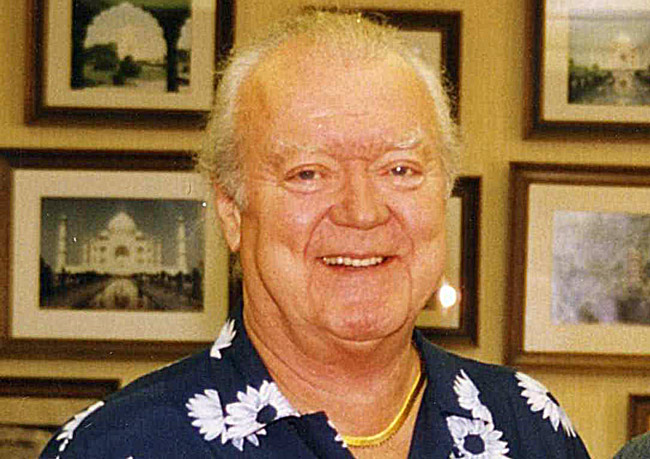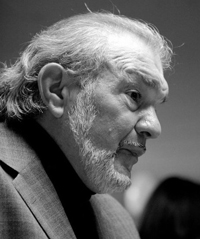
With the loss of Dr. Edmund Skellings, who died on Aug. 19, Florida is left without a state Poet Laureate. And there’s not necessarily a plan to appoint someone else to take his place, leaving Florida poets, or at least the approximately 200-member Florida State Poets Association (FSPA) listening to “silence deep as death” (as Scottish poet Thomas Campbell might have put it).
Skellings was only the third poet laureate in Florida history when Gov. Bob Graham selected him from over 400 nominees in 1980, and declared the state’s “official visionary.” In 1979 he’d been a Nobel Prize nominee for a collection called Nearing Millenium. In 1976, he was a Pulitzer Prize nominee for Heart Attack.
Skellings, who got his doctorate from the University of Iowa where he later taught prosody and metrics, had been suffering from ill health for a few years after a near fatal heart attack, says David Axelrod, FSPA vice president-elect, and former poet laureate of Long Island.
On Thursday (Sept. 6), from 5 to 7 p.m., Axelrod will host what was originally supposed to be a tribute to Skellings, but will now be a memorial, which will be held at the Regional Library on City Island in Daytona Beach. He also hopes to use the event as a podium to voice the precarious position of the laureate post.
“Before Skellings died, he had wanted to step aside, so he could retire with dignity,” Axelrod said. But the honor of being named Florida Poet Laureate is a lifetime one. It wasn’t that Axelrod and his fellow poets hadn’t tried to relieve the ailing Skellings. They managed to get a bill drafted during the last session of the Florida Legislature to “promote the reading, writing, and appreciation of 27 poetry throughout the state” and to make the laureate position a four-year-term. The governor would make the final decision as to who was awarded the position.
The bill went through all the proper committees and was received favorably, Axelrod says, but it died “for no other reason than they were too busy with more important legislation, even though Ed was barely hanging on.” That’s ironic, considering that Skellings was responsible for giving the Florida House of Representatives its first networked computer system in 1986. (We’ll get to that side of Skellings’s world in a moment.)
With Skellings’s death, new questions arise as to how to proceed. Axelrod is hoping no new appointment will be made until spring, when another legislative solution may be attempted. If poet-lobbyists can “soften Tallahassee,” as Axelrod puts it, the new laureate would mark Florida’s 500-year anniversary in 2013. “We have to make people aware, so that it becomes a priority for the legislature.”
But it’s possible in the current political climate that the position won’t be renewed at all. “The word on the street is ‘we’ve got so much to do and so much to worry about, why would we worry about poetry?’” Axelrod says. “It would be a step backwards. To have had one and then not to have one, what would that do?”
The laureate position isn’t just about poetry, Axelrod notes. “It’s an educational, cultural and public service. The laureate should encourage kids not only to get into poetry but also to read and write more. Most kids in school see nothing in poetry. They’re busy trying to decipher some hidden meaning that only the teacher knows. The laureate should make it relevant.” Axelrod points out that getting involved in either poetry or creative writing breeds a more literate mind, one more in tune with critical thinking. “Ed was a perfect example of that.”
Skellings brought new meaning to the idea of literacy. He called himself the “electric poet.” He used computers very early, taking advantage of strange and exotic sound systems and synthesizers before they became popular in Hip Hop. He started fiddling around with the new technology that one might think would be out of his element and began displaying his poetry on different colored monitors. When he put it on a blue screen, he’d say it was sad poetry. When he put it on a red one, it was either sexy or angry: to him, color augmented language on the screen.
From there Skellings came up with what seemed like another harebrained idea. He was going to patent this concept. “People told him he was crazy. They said, ‘you can’t own that!,’” Axelrod recalls. Crazy or not, Skellings did just that and, according to Axelrod, five major companies, including IBM, Zerox, and Atari, bought him out. Just like that Skellings became a millionaire. “That’s what I’m talking about—Ed was a very big educator. A Poet Laureate is not singularly a poet. He or she is a multifaceted literate person.”
Beyond the danger of the post remaining unfilled, the governor could also put in anyone, including a big donor or a politically connected person. That’s why Axelrod and other FSPA members are advocating for a committee to play a large role in the selection process. Theoretically, Axelrod says, the committee should be made up of one or two educators, a couple of poets, and, maybe a politician or a business leader. “There’d certainly have to be an educator or poet involved. It couldn’t be made up of just anyone. We don’t want a hack job,” he said.
Nor should lawmakers fear cost: “Taxpayers don’t have to put up a penny. No new money will come out of the general fund,” Axelrod said. The State Council of the Arts has between $5,000 and $10,000 from the National Endowment of the Arts, or NEA, to promote the arts in the state. Grants would be used to run the laureate’s program without compensating the laureate himself (or herself). Skellings wanted to endow private monies or donations towards the publication of poetry for either the laureate, or maybe even a young poets’ anthology. That could in effect get them exposure or scholarships.
The shorter terms would help tap Florida’s vast talent swamp. “There are so many wonderful writers and poets here,” Axelrod said. “I have been forwarded and subsequently personally developed a list of poets in Florida, both affiliated with colleges and working on their own, which now totals about 40 names. Near the top of that list is the Poet Laureate of St. Pete, Peter Meinke, whom Ed himself mentioned as possible successor. Yes, there are numerous worthy poets in line for the appointment and always new talent emerging—with well-received books and prizes—so filling the post every two years or three or four will not present a problem.”
The new FSPA president-elect, Joe Cavanaugh, suggests that a poet laureate be named for Volusia County, Daytona Beach, and New Smryna Beach. Flagler Beach established appointed its own, first poet laureate last year, the title going to Stan Drescher.
Another function of the September 6 meeting is to bring people together from other artistic disciplines, not only poets.
John Sbordone’s plays at Palm Coast’s City Repertory Theater, hosted by the Hollingsworth Gallery in Palm Coast’s City Market Place, are a good example of the cross-fertilization Axelrod refers to. about. Sbordone has actually incorporated some of Axelrod’s poetry to use as transitions in his rendition of “Jacques Brel Is Alive and Well and Living inn Paris,” which originally aired off Broadway in the 70s. “The transitions (between songs) were dated,” Sbordone said of what he called stilted dialogue that came from Brel, who he compared lyrically and emotionally to Bob Dylan. Instead, Sbordone inserted two poems from Axelrod, whom he met at a Cinematique film event, “Poetry.” Sbordone also added the poetry of such luminaries as Maya Angelou and E.E. Cummings. Axelrod and other poets frequently attend City Repertory shows, Sbordone says.
The insurgence of poetry seems to be part of a larger trend in the Palm Coast art scene. The Gargiulo Art Foundation recently put on a Bike and Poetry show at Hollingsworth, and the Flagler County Art League held its first poetry competition, “Flagler in Words,” this past February as part of its Flagler County theme art show.

“Theater started as poetry,” Sbordone says, referencing Dithyrams, the ancient Greek hymns sung in honor of Dionysus. “Theater at its best is a visual poem. People have such a narrow view of what theater is. Theater uses all kinds of materials to perfect its art. Broadway might be technically proficient, but let’s not forget about Shakespeare.”
Meanwhile, Axelrod is optimistic. “I am in touch with the governor’s office and asking for a proclamation to honor Ed, plus Ms. Ann Scott has expressed an interest in sending a letter to honor him from her own office. So we presently are working to put a positive sentiment on the need to renew the laureate post.” And it’s not as if the Scotts are indifferent to Florida literature, as Ann Scott’s hosting of the Florida Book Award winners illustrates.
![]()
The poet laureate tradition can be traced back to Ancient Greece, with the word laureate, a term developed later, deriving from the word laurel, with which the Greeks would wreathe their champions. The term was first made relevant to the Western World when it was attached to the royal British household of King James the 1st who unofficially created the position for the acclaimed playwright and poet Ben Johnson in 1617. An official post attached to the responsibilities of commemorating national and royal occasions didn’t come along until John Dryden received his appointment in 1668.





























Dub Drinnon says
I thought you might be interested/amused at a little tribute I wrote for Dr. Skellings after
meeting him a few years ago. It has three verses, but I remember only the first one:
“Edmond Skellings”
I chanced to meet a man today
A real man, he
A tribute and a throwback to the way
Man ought to be
His heart was wide as day is wide
Its love leapt high
And in a strange admiring way
As lesser poets may
I head me wonder why
He hath descended from the sky…..